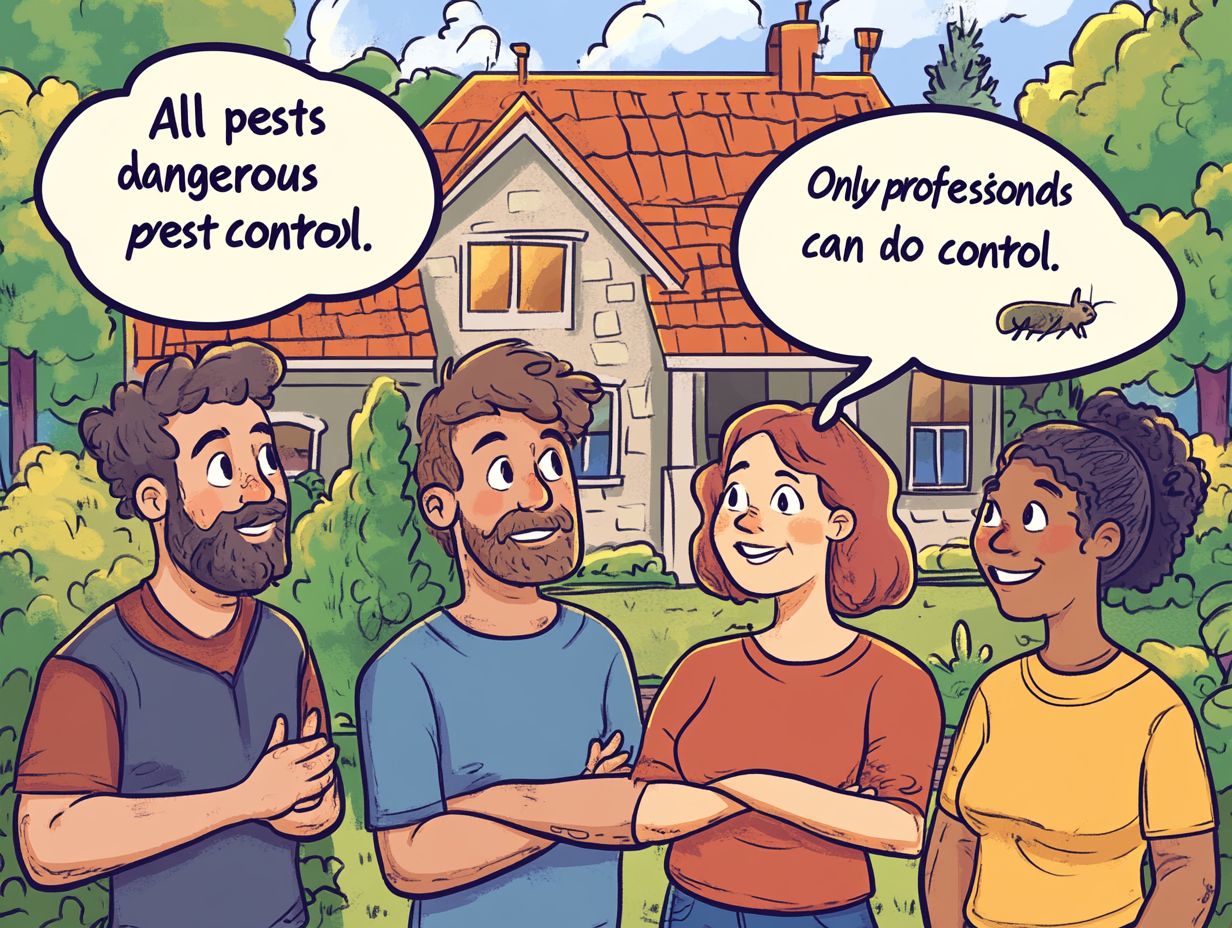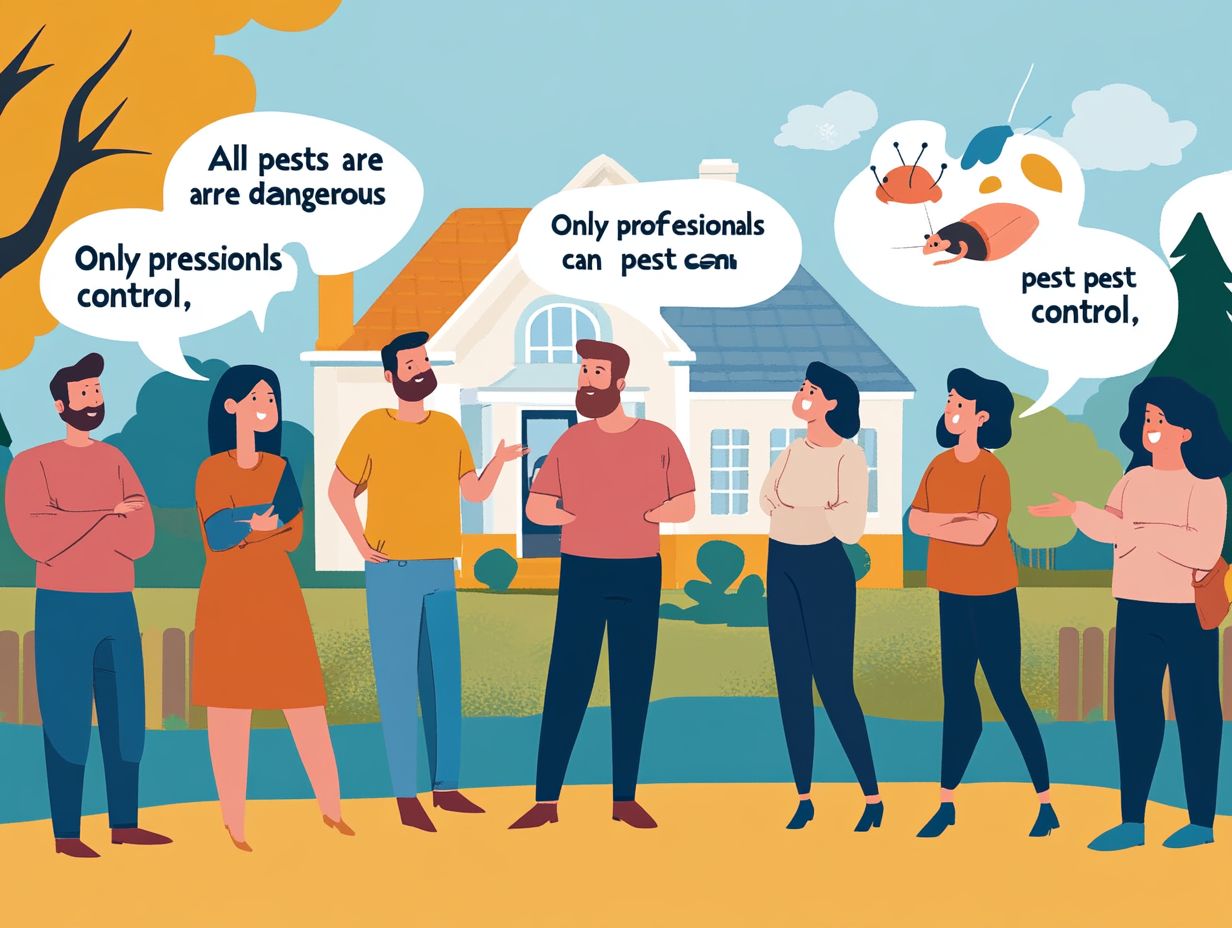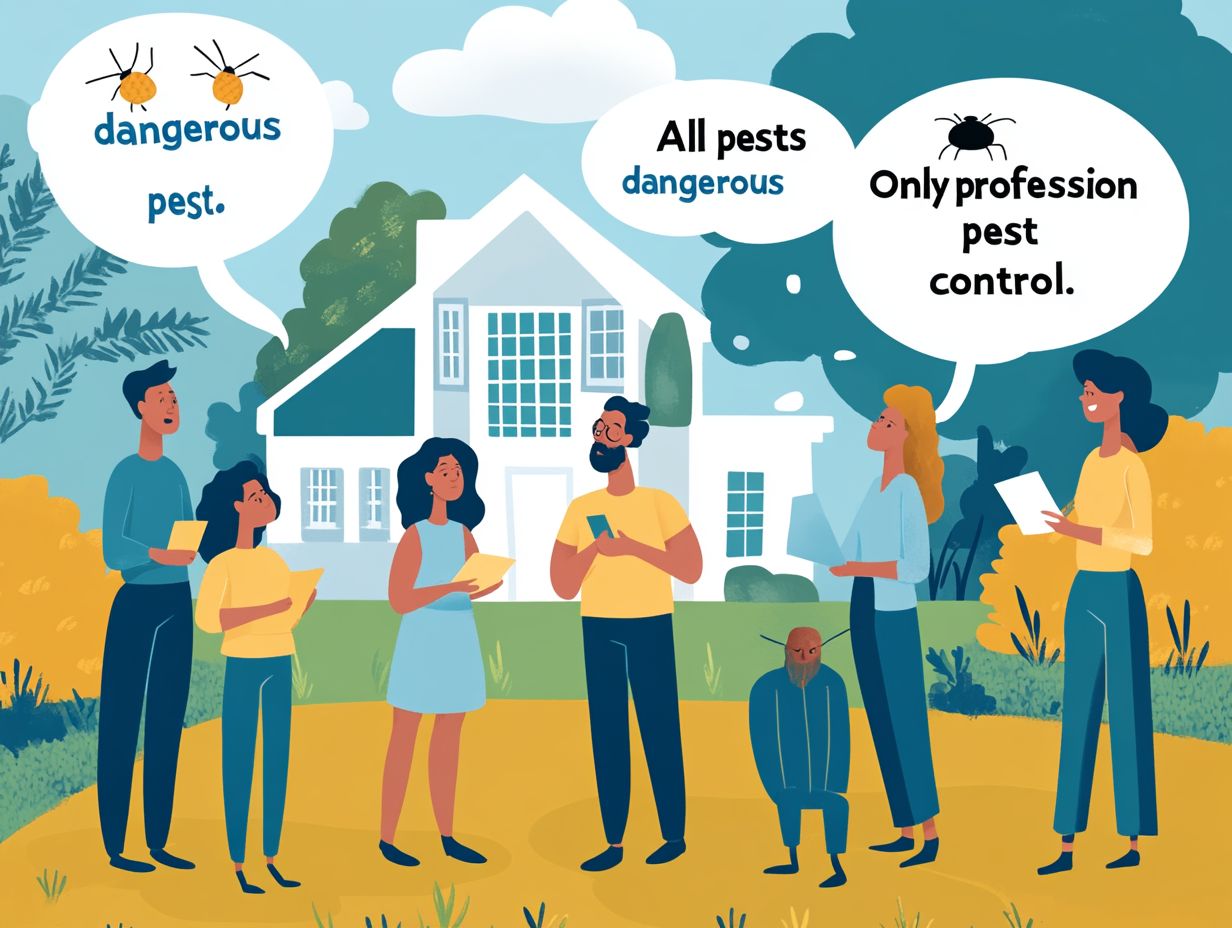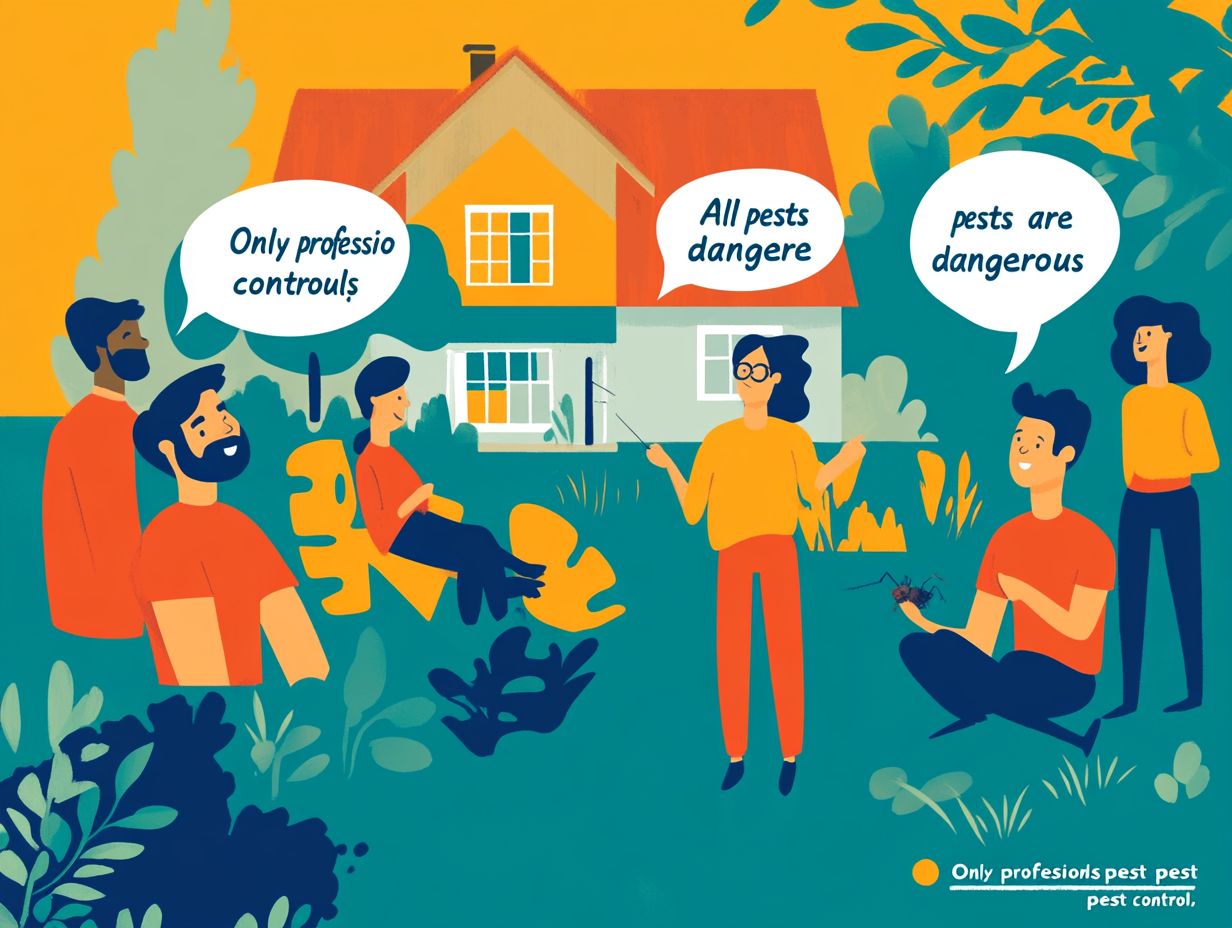5 Common Misconceptions About Pest Control
Pest control is often surrounded by myths that can lead to misunderstandings and ineffective practices. You might think that pest control is only necessary when critters are visible or that your DIY solutions can compete with professional expertise. Let’s tackle these myths head-on and empower you to take action against pests!
This article delves into five common misconceptions about pest control, debunking these myths and offering essential insights. From understanding the importance of proactive measures to exploring the various methods required for different pest species, discover how to effectively safeguard your home or business.
Contents
- Key Takeaways:
- 1. Pest Control Is Only Necessary When You See Pests
- 2. DIY Pest Control Is Just as Effective as Professional Pest Control
- 3. All Pests Can Be Treated with the Same Methods
- 4. Pest Control Is Only Necessary for Homes, Not Businesses
- 5. Pest Control Is Expensive and Not Worth the Cost
- What Are the Different Types of Pest Control Methods?
- Frequently Asked Questions
- What are the most common misconceptions about pest control?
- Are DIY methods as effective as professional pest control?
- Do pests only infest dirty homes?
- Is pest control harmful to the environment?
- Should I wait until I have a pest problem to schedule pest control services?
- Are all pests harmful and need to be eliminated?
Key Takeaways:

- Pest control is not just about visible pests; preventative measures are also important to keep them away, including pest prevention tips.
- DIY pest control may not be as effective as professional services, which provide necessary expertise and equipment.
- Not all pests can be treated with the same methods; different pests require different approaches for successful elimination.
1. Pest Control Is Only Necessary When You See Pests
Many homeowners in St. Augustine think that pest control is only necessary when they spot pests around their homes. However, this misconception can lead to significant infestations that often go unnoticed until causing structural damage or other serious issues.
Regular pest inspections are essential for keeping your home safe and free from damage. Some pests, like termites, have a knack for hiding, often revealing their presence only after compromising the integrity of wooden structures.
By scheduling routine inspections, you can catch potential problems early, saving yourself from costly repairs in the future. Proactive pest management helps maintain a healthy living environment and shields you from various health risks associated with infestations.
Debunking the myth that pest management is only for visible issues underscores the importance of ongoing vigilance. Pests can thrive in the shadows, making pest control strategies far more effective than waiting for eradication.
2. DIY Pest Control Is Just as Effective as Professional Pest Control
While DIY pest control methods might seem like a budget-friendly option, they often don’t measure up to the expertise and effectiveness that trained pest exterminators provide.
You might underestimate the intricacies of pest behavior or opt for treatments that offer only fleeting relief, leaving deeper issues unresolved. This misstep can lead to recurring infestations and potential health risks from either the pests themselves or the harsh chemicals involved. Instead, consider implementing eco-friendly pest control practices for a more sustainable solution.
Professional pest control companies have extensive knowledge and experience. They utilize advanced pest management techniques tailored to your specific situation. This approach not only delivers immediate results but also establishes long-term prevention strategies, helping you maintain a pest-free environment and ultimately saving you both time and money.
3. All Pests Can Be Treated with the Same Methods
A common misconception in the pest control industry is that a one-size-fits-all approach can handle every pest. In reality, different pest species demand customized techniques and treatments to achieve the best results.
For example, bed bugs love to hide in crevices and require heat treatment or specialized insecticides for effective eradication. Termites, the silent destroyers of wooden structures, need a comprehensive strategy think bait systems or liquid treatments to tackle the colonies at their source. Mice, often invading urban spaces, call for trapping and exclusion methods to keep them from coming back.
Grasping the specific characteristics and behaviors of these pests is essential, as proper identification greatly impacts the success of your pest management strategy. This is where professional exterminators truly shine. They possess the expertise and tools to accurately diagnose your pest problem and recommend the most effective treatment tailored to your unique situation.
Don’t wait for pests to invade; act now!
4. Pest Control Is Only Necessary for Homes, Not Businesses

Many people mistakenly think pest control services are only important for residential properties. However, businesses in St. Augustine face significant pest issues that can seriously impact their reputation and how well the business runs.
In commercial environments, pests can pose serious food safety concerns, especially in the food and hospitality sectors. Just one infestation could lead to hefty fines or even temporary closure. Ignoring pest issues erodes customer trust and tarnishes brand integrity, often resulting in negative reviews and a dip in patronage.
Understanding these risks, pest control companies provide tailored services specifically designed to meet the unique needs of commercial establishments. By implementing proactive pest management solutions, these experts help businesses create and maintain a safe, clean, and inviting atmosphere for customers.
5. Pest Control Is Expensive and Not Worth the Cost
While you might view pest control as an unnecessary expense, the huge costs of ignoring pest problems like structural damage and health risks far outweigh the investment in professional services.
By choosing regular pest management, you can significantly reduce the financial burden that severe infestations often bring, which frequently lead to costly repairs. Investing in prevention now saves you from the hefty bills associated with a major outbreak, protecting your property from extensive damage and your health from pest-borne diseases.
Many pest control companies offer service contracts that allow you to budget effectively. These contracts not only make ongoing pest management more affordable but also ensure your home remains protected throughout the year. This ultimately provides you with peace of mind and a healthier living environment.
What Are the Different Types of Pest Control Methods?
You have a variety of pest control methods at your disposal today, ranging from traditional extermination techniques to cutting-edge, eco-friendly green methods that prioritize non-toxic options for a safer environment.
Understanding these methods is essential for effectively tackling pest-related issues. Each approach comes with its own distinct applications and benefits. While chemical treatments can deliver quick results, they may carry risks for human health and the ecosystem definitely something to consider if you have children or pets at home.
On the flip side, non-toxic methods like essential oils or diatomaceous earth provide safer, though sometimes slower, solutions. Integrated pest management, a combination of different pest control strategies that focus on both prevention and treatment, is another avenue worth exploring. This ensures a balanced approach tailored to the specific pest and its environment.
In the end, assessing your situation is crucial for selecting the most effective pest treatment as part of a comprehensive pest management plan. This ensures that you achieve both efficacy and safety.
How Can One Prevent Pests from Entering Their Home?
Want to keep pests out of your home? Implementing effective pest prevention strategies can significantly decrease the chances of unwelcome guests infiltrating your home by tackling the key elements they crave: food, water, and shelter.
Taking a proactive approach is essential. For instance, storing food in airtight containers not only keeps your pantry looking sharp but also robs pests of their favorite nibbles. Maintaining a consistent level of cleanliness throughout your space is equally vital. Regularly sweeping, vacuuming, and wiping down surfaces can eliminate those tempting crumbs and spills that attract insects.
Sealing entry points, like gaps around windows and doors, can effectively block unwanted visitors from making their way inside. Understanding the behavior of common pests also gives you the power to identify and minimize potential attractants, creating a safer and more comfortable living environment for you and your family.
Start these strategies today to keep your home pest-free!
What Are the Risks of Not Addressing a Pest Infestation?

Ignoring a pest problem can lead to structural damage, health risks from diseases, and rising costs for emergency services.
Consider the disruption pests like bed bugs can cause to your sleep, not to mention the anxiety they bring. Cockroaches are particularly notorious, often triggering asthma and allergies. Mice can also carry various pathogens, leading to food contamination and serious illnesses.
It’s vital to be vigilant for early signs of these infestations, such as:
- Droppings
- Unexplained marks on walls
- Unexplained odors
Taking timely action is key to mitigating these risks. Keeping your home clean helps prevent pest issues. Sealing off entry points can effectively keep these unwelcome visitors at bay. Regular inspections and professional pest management are essential to ensure your living environment remains safe and free from long-term damage.
How Do Seasonal Changes Affect Pest Control Needs?
Seasonal changes in St. Augustine can greatly influence pest behavior, leading to varying pest control needs throughout the year and requiring tailored plans from pest control professionals.
As the weather shifts, you’ll notice distinct patterns affecting how pests engage with their surroundings. For instance, during the spring, warmer temperatures and abundant food often spark increased ant activity, prompting you to take more preventive measures. On the flip side, when winter sets in, you may find yourself dealing with rodent invasions as these critters seek warmth and shelter indoors.
Expert pest control professionals know how to handle these seasonal changes. They implement effective strategies tailored to each period, like seasonal traps and treatments, ensuring your home remains pest-free. By adapting to nature’s rhythms, these specialists help you maintain a harmonious living space all year round.
What Are the Most Common Pests Found in Homes and Businesses?
Know the common pests that invade homes and businesses like termites, bed bugs, and cockroaches to manage them effectively.
When you recognize these pests, you re not just formulating an accurate response; you re also taking crucial steps to prevent significant damage and health risks. For example, termites can tunnel through wooden structures, often flying under your radar until extensive damage has already been done. Bed bugs are equally insidious, hiding in mattress seams and furniture crevices, leaving behind itchy bites as their unwelcome calling card.
Then there are cockroaches, notorious for infesting kitchens and bathrooms and leaving droppings that can trigger allergies. Properly identifying these unwelcome guests is fundamental. It allows for targeted pest control services to address specific issues, ensuring your environment remains healthy and safe.
How Can One Find a Reliable and Effective Pest Control Service?
Choosing a trustworthy pest control service means considering key factors like company reputation and the expertise of their technicians.
Delving into customer reviews is essential; these insights from past clients will give you a clearer picture of the service quality you can expect. It s also crucial to check for proper certifications, ensuring that the technicians adhere to industry standards and safety regulations. Explore the range of services offered, as a comprehensive approach to pest management often yields better results.
When you choose expert exterminators who use safe and effective techniques, you not only tackle pest issues promptly but also prioritize the safety of your environment and home. These professionals should be eager to provide you with thorough advice on preventive measures to keep those pesky invaders at bay.
Frequently Asked Questions

What are the most common misconceptions about pest control?
Many believe DIY methods are as effective as professional pest control. Others think pests only infest dirty homes or that pest control harms the environment.
Are DIY methods as effective as professional pest control?
No. DIY methods may provide temporary relief, but professionals can identify and eliminate pest problems at the source for long-lasting results.
Do pests only infest dirty homes?
No, pests can invade any home. Even clean houses can have issues due to cracks or open food containers.
Is pest control harmful to the environment?
No, modern pest control methods are safe for both the environment and non-target animals. Professionals follow strict regulations to ensure safety.
Should I wait until I have a pest problem to schedule pest control services?
Don t wait for pests to invade your home! Schedule regular pest control to prevent costly issues and health risks.
Are all pests harmful and need to be eliminated?
Not all pests are harmful. Some, like spiders and ladybugs, can actually benefit the environment and should be left alone.






